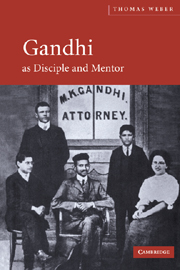Book contents
- Frontmatter
- Contents
- Notes
- Preface
- Glossary
- PART I INFLUENCE
- PART II GANDHI INFLUENCED
- PART III GANDHI'S INFLUENCE
- 8 The influential Gandhi
- 9 Arne Næss – the ecological movement finds depth
- 10 Johan Galtung – peace research moves beyond war
- 11 E. F. Schumacher – economics as if people mattered
- 12 Gene Sharp – nonviolence becomes a political method
- 13 The bottom of the hourglass: Gandhi's influence
- Bibliography
- Index
10 - Johan Galtung – peace research moves beyond war
Published online by Cambridge University Press: 22 September 2009
- Frontmatter
- Contents
- Notes
- Preface
- Glossary
- PART I INFLUENCE
- PART II GANDHI INFLUENCED
- PART III GANDHI'S INFLUENCE
- 8 The influential Gandhi
- 9 Arne Næss – the ecological movement finds depth
- 10 Johan Galtung – peace research moves beyond war
- 11 E. F. Schumacher – economics as if people mattered
- 12 Gene Sharp – nonviolence becomes a political method
- 13 The bottom of the hourglass: Gandhi's influence
- Bibliography
- Index
Summary
INTRODUCTION
Johan Galtung is one of the great figures in peace research. In 1959 he established the first peace research academy, the International Peace Research Institute in Oslo (PRIO) and served as its director for ten years. In 1964 he also launched the Journal of Peace Research, one of the two leading scholarly journals in the field. Although the Journal of Conflict Resolution had already been around for over half a dozen years, its empirical agenda did not reflect Galtung's own broader and structural approach to violence in the way the new journal would. PRIO did not hide behind the politically less controversial (and less blatantly normative) category of conflict research, and likewise in the first issue of the Journal of Peace Research, where Galtung defined peace as having both negative and positive aspects, he announced the birth of the discipline of peace research. He has written dozens of books and hundreds of published articles, served as a professor or visiting professor of peace studies in countless universities on five continents and acted as a consultant to ‘virtually every United Nations agency’. While not without his critics, Galtung has almost single-handedly shifted the focus of peace research, and especially its classroom sibling peace education, to encompass areas such as exploitation and oppression instead of merely the avoidance of war.
- Type
- Chapter
- Information
- Gandhi as Disciple and Mentor , pp. 203 - 217Publisher: Cambridge University PressPrint publication year: 2004

